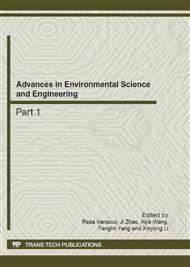p.3488
p.3496
p.3501
p.3507
p.3512
p.3518
p.3522
p.3527
p.3531
Study on Rewards and Punishments Mechanism of Reverse Supply Chain with Random Collection
Abstract:
Based on the energy recycle ideas, in view of the three-level green supply chain (GSC) including a manufacturer, a processor and a collector, the manufacturer-leading Stackelberg models were established with random recycling. The rewards and punishments contract between the manufacturer and the processor was designed, and the influences of the proposed mechanism to the game parties’ optimal strategies were discussed. The research shows that implementation of the rewards and punishments mechanism is effective to improve the effort-level for recycling end of life (EOL) product, and increase the processing rate of EOL product. The conclusions are helpful to guide the formulation and implementation of the strategy of sustainable development in China nowadays. In addition, the research has great realistic significance for instilling the consciousness of environmental protection.
Info:
Periodical:
Pages:
3512-3517
Citation:
Online since:
May 2012
Authors:
Price:
Сopyright:
© 2012 Trans Tech Publications Ltd. All Rights Reserved
Share:
Citation:


